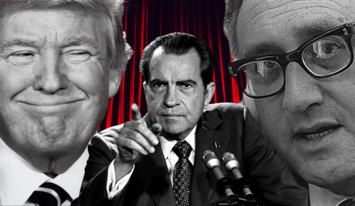
If the election of Donald Trump means anything, it marks the end of the liberal world order and its replacement by grim realpolitik, described by one MIT analyst as “the pursuit of vital state interests in a dangerous world that constrains state behavior.” Realpolitik may be ugly but it’s back. It is already being ruthlessly practised by China, Russia, Iran, and North Korea, but it has also been central to the Trumpian worldview since his first term. Whereas his predecessors sought engagement with other countries, Trump’s style will be to cut deals narrowly perceived as beneficial to the United States.
Trump will be less like Roosevelt or Reagan, who led crusades against authoritarianism, and more like Lord Palmerston, who famously remarked that his country had “no permanent allies, only permanent interests.” Other icons of realpolitik include Austria’s 19th-century minister of foreign affairs Klemens von Metternich, Wilhelmine Germany’s Otto von Bismarck, or the US’s Richard Nixon and Henry Kissinger, who ditched morality in pursuit of “an equilibrium of forces.”
How the Liberal World Order Failed
The new realpolitik marks the end of an era in which politics was defined largely by ideology and religion. As in the 19th century, world events now revolve around control of markets, resources, technology, and military aptitude. In this new paradigm, institutions like the United Nations and the International Court of Justice are largely irrelevant, as are climate confabs and the high-minded pronunciamentos of the World Economic Forum.
Joe Biden’s foreign policy was informed by Wilsonian notions of global liberalism, an ideology that also permeated US policy during the presidencies of George W. Bush and Barack Obama. Although these administrations approached foreign relations very differently, they both embraced the allegedly democratising influence of free trade and the need to protect the “rules-based” postwar order. Yet the legacy of this approach has been involvement in open-ended wars that often resulted in strategic defeats.
The shift to Trumpism is unsurprisingly causing panic among the US’s old allies, particularly France and Britain. Le Monde, a publication not known for its pro-American sympathies, calls Trump’s election a “nail in the coffin” of America’s “democratic model.” Much of the US policy establishment is similarly horrified by the prospect of an administration that promises to prioritise American interests with a doggedness, and even glee, rarely seen since the early republic.
If a European bureaucracy faced with increasingly right-leaning populations and its American allies want to know what has precipitated this change, they ought to look in a mirror. Biden’s early proclamations that “America is back” seem, in retrospect, close to delusional. Rather than firming up the West, Biden’s secretary of state Anthony Blinken—whom Tablet acidly described as “Neville Chamberlain with an iPad”—has been a fevered fireman unable to put out fires.
Blinken’s foreign-policy script has failed to arrest China’s rise, prevent or repel Russia’s brutal invasion of Ukraine, and has seen an equally awful conflict erupt across the Middle East. America may still be a world-leading military and economic power, but it has been unable to cope with assaults on its economy, its communications, and even its elections by Russia, China, and Iran. Trump can claim, with some justification, that he left the White House in an era of relative peace and has returned to a chaotic world in which the West is in retreat.
Read the rest of this piece at Quillette.
Joel Kotkin is the author of The Coming of Neo-Feudalism: A Warning to the Global Middle Class. He is the Roger Hobbs Presidential Fellow in Urban Futures at Chapman University and and directs the Center for Demographics and Policy there. He is Senior Research Fellow at the Civitas Institute at the University of Texas in Austin. Learn more at joelkotkin.com and follow him on Twitter @joelkotkin.
Photo: Wikimedia photos/Canva.












